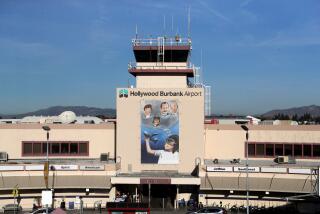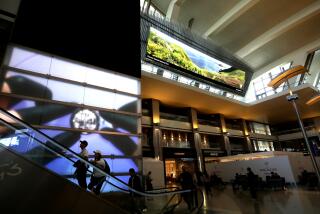Lockheed Division Banks on Airport Privatization
- Share via
Ever since Lockheed bought it in 1940, the air terminal division has never been the pride of its fleet.
The Calabasas-based aerospace giant’s top divisions build such things as nuclear missiles, spy satellites, cargo jets and fighter planes.
Lockheed Air Terminal, based in Burbank, doesn’t do anything nearly so complicated. The company’s 1,100 employees manage 4 airports, including the one at Burbank, along with a portion of operations at 14 other airport terminals around the world. They do maintenance work, assign gates to airlines and collect rent from newsstands and other stores inside the terminals.
Lockheed doesn’t stint on its annual reports, devoting more than a dozen pages of color photographs to extolling the company’s many projects. But the Air Terminal division received only a brief paragraph in Lockheed’s most recent annual report. Lockheed Air Terminal President Viggo Butler quipped that some of Lockheed’s top executives don’t even know his division exists. “When they answer the phone,” he said, only half-jokingly, they ask, ‘Who? Who? What company?’ ”
New Plan
But Lockheed Air Terminal has recently embarked on a new business plan that, if successful, should enable it to shed its identity crisis. The company is about to become the first U.S. concern to build, manage and actually own a terminal used at a commercial airport.
Lockeed Air Terminal is only one of two corporations worldwide that are participating in the growing trend to privatize the ownership of airports, which are usually owned by governments.
For instance, Lockheed, along with a Canadian real estate developer, is building a $300-million terminal at Lester B. Pearson International Airport in Toronto. The two companies will own the terminal, which will have 24 aircraft gates and a 3,000-space parking garage, and Lockheed will operate it.
“We leased the land, built the building and will rent it out,” Butler said. “The government did not put up any money at all.”
For its investment, Lockheed Air Terminal receives a portion of the terminal’s landing fees, parking concessions and store rents.
The established leader in this business is The British Airports Authority, known as BAA PLC, which is the only large private developer and operator of commercial airports. The company owns and manages London’s Heathrow and Gatwick airports among others in Great Britain.
If BAA is any indication, owning airports can be a profitable business. For the year that ended in March, 1988, BAA earned a profit of $170 million on revenue of $880 million. Salomon Brothers analyst James C. Halstead in London estimates that the company did even better in the year that ended last month.
“They are highly profitable,” Halstead said. “BAA is virtually a cash machine.” The total market capitalization of BAA--which is the total value of all its stock--is $2.85 billion, which is about what all of Lockheed Corp.’s common stock is worth.
BAA was a federal agency until it was sold to the public as a private company in 1987 as part of Prime Minister Margaret Thatcher’s sweeping divestiture of government holdings, including British Airways and Rolls-Royce.
Lockheed hopes to take advantage of the swing to privatization that is particularly appealing to foreign governments. The Federal Aviation Administration reports that international travel has increased nearly 30% this decade, from 24 million passengers in 1980 to 31 million in 1987. But while many foreign airports are operating at maximum capacity, the governments that own them are too debt-ridden to take on any more loans to build new terminals.
Conflicting Demands
“Governments just can’t come up with the money overnight with all of the conflicting demands, so we think privatization is the answer,” Butler said.
Turkey has tentatively agreed to a $700-million expansion of Istanbul’s Ataturk Airport that will include a new terminal and a World Trade Center. Lockheed Air Terminal is the lead partner in a consortium that includes three Turkish construction companies and Fluor Corp. of Irvine. Lockheed will supervise the design and the construction of the new terminal and then will operate it.
The expansion is scheduled for completion in 1992 and will more than double air traffic at Istanbul from 3.5 million passengers to 7.1 million.
Lockheed doesn’t break out the sales figures for its Air Terminal division, and Butler won’t say what kind of profit Lockheed expects to make from either the Toronto or Turkish projects. “The financial studies and models all show it to be attractive,” he said. “But we don’t know yet because we haven’t opened it. It remains to be seen but we expect it to be a good business.”
Risks Involved
The privatization of airports isn’t without risks. The Turkish agreement calls for Lockheed and its partners to turn over ownership of the terminal to the Turkish government after 15 years. “We get our returns and our equity back, and at the end of 15 years it all washes away and they get the building,” Butler said.
But Halstead warned that the average break-even point on a big airport terminal project is about 25 years.
Butler maintained that the Turkish project will become profitable within 15 years, but that is calculated on the assumption that there will be a big jump in the number of planes bound for Turkey. “It’s risky in the sense you worry about traffic varying over the years,” he said. Government unrest, of course, could seriously damage Turkey’s growing tourism industry.
Doesn’t Employ Guards
Lockheed said it doesn’t have to worry about potential liabilities from terrorism because it doesn’t employ the guards who patrol airports. Most foreign countries employ private companies or have their own security forces.
“Governments don’t fund the hotels, they don’t fund the airlines, they don’t fund the taxis driving to and from the airport, so why should they have to fund the airport?” asks Butler. “Any risks--like those the airlines have--are insurable.”
Lockheed Air Terminal was founded in 1929 by United Airlines for the sole purpose of building the Burbank airport. Lockheed Corp. acquired the company from United in 1940. Butler’s office is in a nondescript two-story building that was once the original headquarters for Flying Tigers. His office window looks out on the company’s parking lot and the barbed wire that surrounds it.
Because of its new projects, Lockheed Air Terminal is moving to a more impressive Burbank office tower. “We’ve decided to move across town,” Butler said. “We’re going over to the Security Pacific bank building and be on the top floor.”
Butler says it’s a new start for his tiny division. “The privatization of airports is something we think is going to be significant, not just for our division but for all of Lockheed,” he said.
More to Read
Inside the business of entertainment
The Wide Shot brings you news, analysis and insights on everything from streaming wars to production — and what it all means for the future.
You may occasionally receive promotional content from the Los Angeles Times.










